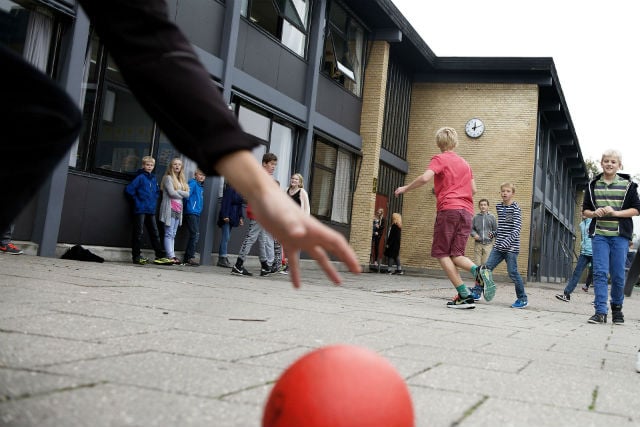- Here is Denmark’s new communication platform for parents and schools
- Why Denmark’s vaunted school system is showing signs of wear
- The Danish schools where the kids make the dinners
SCHOOLS
Denmark drops plans to slash subsidies for free schools
Denmark's new government has abandoned an attempt to cut 300m Danish kroner ($44m) from the annual subsidy given to privately-run schools in Denmark.
Published: 5 November 2019 10:17 CET

Children play at Taastrup Private School outside Copenhagen. Photo: Liselotte Sabroe/Ritzau Scanpix
The cuts would have meant about 3,000 kroner less per pupil going annually to the schools.
The schools, which are privately run but subsidised by the state, include schools teaching in English, German and French, schools serving Jewish and Muslim minorities, and schools following different pedagogical ideas.
“I was very worried yesterday, because it would have been a huge challenge for all the schools to lose five percent of their state subsidies,” said Peter Bendix Pedersen, Chairman of the Danish Free Schools Association.
“If it's going to be a real possibility for everyone to send their children to a free school in Denmark, then the subsidy has to be high.”
The ruling Social Democrats dropped the proposal after facing stiff opposition in budget negotiations on Monday evening, with both their allies the Social Liberal Party and the opposition Liberal Party opposing the plan.
“The free schools and all the children and parents who use them can breathe a sigh of relief,” the Social Liberal Party's leader, Morten Østergaard told the Ritzau newswire on Monday night.
“We have eliminated one of the cuts that to our great surprise found its way into the Social Democrats' budget proposals.”
READ ALSO:
The government had proposed cutting the subsidy for free schools from 76 percent of the average cost of a pupil at a normal state-run school, to 71 percent, aiming to use the money to increase spending on state-run schools.
“As we said before the election, we want to prioritise state schools,” Finance Minister Nicolai Wammen said as he announced the proposal.
Pedersen said that if the cuts had gone ahead, schools would have had to either reduce the quality of the education they provide or increase fees for parents, with some smaller schools in rural areas probably forced to shut down.
“Maybe the parents would have had to pay more for their school fees, and some parents wouldn't be able to pay more than now,” he said.
Denmark pioneered free schools, with the system established more than 150 years ago with the 1855 Free Schools Act.
Unlike in neighbouring Sweden, free schools must be non-profit institutions if they are to receive state subsidies.
The number of free schools has increased in recent years, with parents frequently opening new a free school when the government shuts down small schools in rural areas.
There are currently 550 free schools in the country with about 110,000 pupils. Approximately 18 percent of all primary school children currently attend a free school.
Url copied to clipboard!


 Please whitelist us to continue reading.
Please whitelist us to continue reading.
Member comments